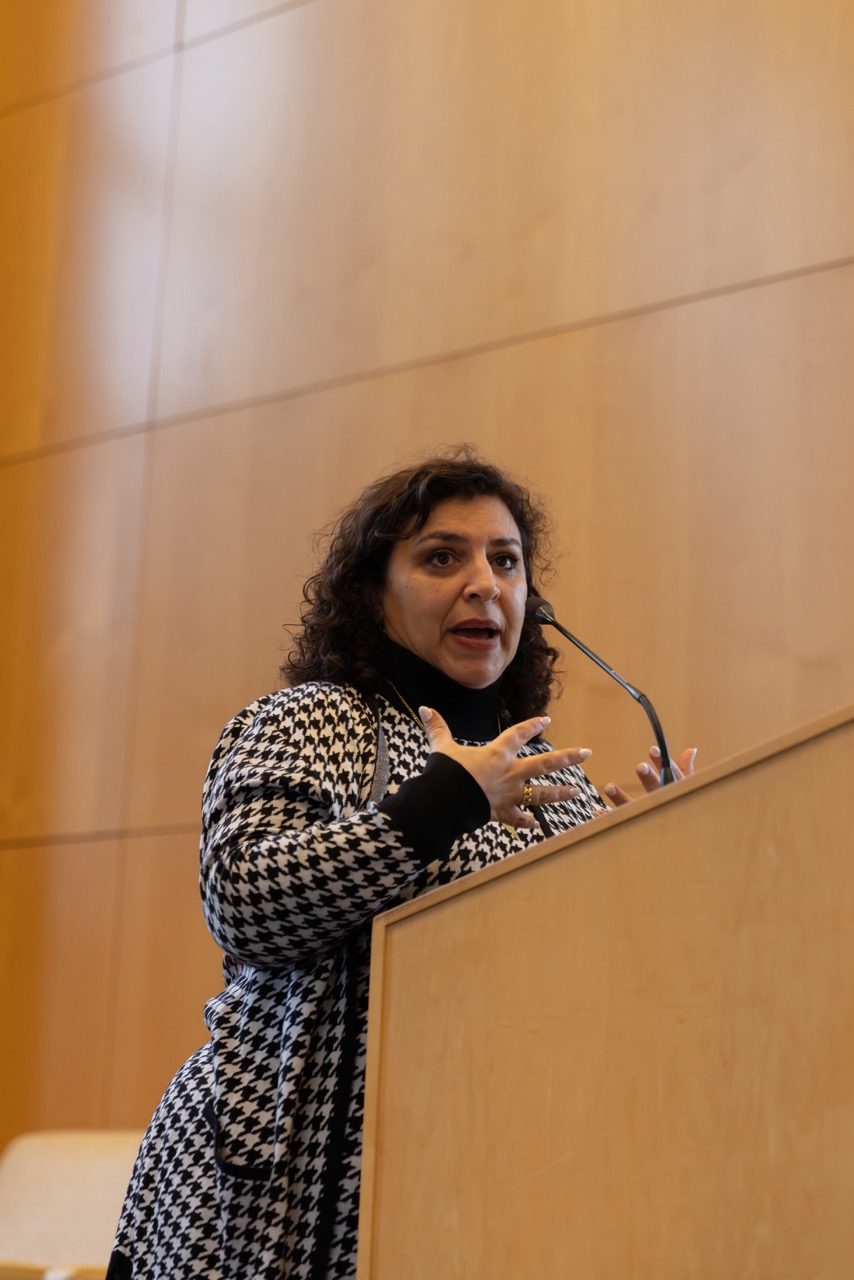
By Max Orr
On March 24, Palestinian poet, essayist and translator Lena Khalaf Tuffaha spoke to students and faculty in the Tahoma Room. The event was hosted by the Department of Religion, Spirituality and Society, with opening remarks by Professor Sam Kigar and an introduction by Professor Renée Simms. Khalaf Tuffaha began with a bit of a reality check. She reminded the audience that we consume Palestinian art and writing while Palestinians continue to be in danger every day. On the day of the event, two Palestinian journalists were assassinated, and as of the writing of this article, 232 journalists have been killed in Gaza. This grounding in reality was an important transition into her poetry.
She read seven of the 30 poems in her 2024 award-winning collection entitled “Something About Living,” all of which are centered on her identity and the Palestinian experience. While much of her poetry focuses on struggle, she also shared the love that comes from that pain. The final poem of the book, entitled “Dukka,” named after a spice mix that holds immense cultural significance for the people of Gaza, ends with the lines: “Let the stars fall. I have no idea / what hope is, but our people / have taught me a million ways to love.”
Her reading comes at a powerful time, with Israel’s March 18 attacks on Gaza breaking a ceasefire deal that many believed would bring an end to the conflict. Khalaf Tuffaha emphasized that the war and humanitarian crisis is ongoing, though attention from mainstream media has dwindled. She noted that the only way to make real change in the U.S.-funded war is to persist in resistance. She believes campus movements across the country have been instrumental to Palestinian perseverance in the face of crisis.
Professor Sam Kigar spoke about the importance of the student protest movement in bringing awareness and change to the U.S.’s response to the crisis in Gaza. In the current political climate, student protest continues to be important, even though the risk of retaliation has increased drastically. “For those of us that have some degree of safety and security, and I put myself in that category, it is time to stand up for what’s right and to elevate our voices,” Kigar said. “We will have the opportunity to look back on this moment, and we will have to ask ourselves if we did the right thing.” College protests provided hope to a people who were in dire need of it. Khalaf Tuffaha said, “It’s not possible to overstate the impact of the student movement for Palestinians.” She believes that the movement is an “incredible act of humanity.” Khalaf Tuffaha continued to express her belief that this movement has made love into a verb “that takes you out of your seat and off your phone and into the street.”
Khalaf Tuffaha, born in Seattle but raised in Saudi Arabia and Jordan, is a Palestinian poet who has authored three books of poetry: “Something About Living” (2024), “Kaan and Her Sisters” (2023), and “Water and Salt” (2017). “Something About Living” was awarded the 2022 Akron Poetry Prize and the 2024 National Book Award. The Judge’s Citation for the National Book Award explains that “this impressive collection serves as a powerful exemplar of devotion — brilliantly rendered in surprising forms — and profoundly teaches us ‘a million ways to love.’” Khalaf Tuffaha writes about the experiences of being someone in the in-between. She is fluent in Arabic and English, and the intersections of her identities are a central theme of her poetry. She also writes extensively about her Palestinian heritage. Much of her work focuses on the historical oppression of the Palestinian people, and as she mentioned at the beginning of her reading, it has gained new relevance since Oct. 7, 2023.
In conjunction with her poetry reading, Khalaf Tuffaha spoke about the often antagonistic approach universities have taken to student protest regarding Gaza. She spoke about the “Normalized violence and anger against Palestinians.” Today, many universities have penalized protestors and severely limited, and even eliminated, the space for productive dialogue. Kigar stressed the importance of maintaining a space for healthy conversation and debate in a climate where that has become less and less common: “The University has been far from perfect in the way that it’s conducted itself over these issues. That said, I think what’s a little bit coming to life for me is that we should appreciate that this has actually been a space of debate. We have to fight for our ability to continue to have these conversations in a way that has already been taken away in many places.” He stressed the importance of having space for open and respectful conversation, and encouraged campus “To have the bravery to be able to continue to encounter one another, to acknowledge that our university is situated inside broader communities and that it is not disconnected from those communities.”
Khalaf Tuffaha’s poetry is centered upon her experience as a Palestinian person living in America. She brings a unique perspective to an issue that gained a special relevance to the University and to the student community. She reminds us to use our unique position as a force for good through healthy dialogue.
